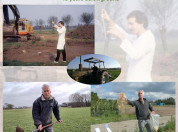Search
Filter by
Type
Tags
Dossiers
Themes
Departments
Active filters
30 search results
Search results
-
National Growth Fund finances Dutch Holomicrobiome Institute
The government of the Netherlands has allocated €200 million from the country’s National Growth Fund for a public-private consortium that will conduct research into 'microbiomes' and economically interesting applications thereof. In the consortium, NIOO is partnering with ten Dutch universities, five university-medical centres, four universities of applied sciences, many other knowledge organisations and together with dozens of small and large companies and societal organisations.
-
From Pioneer to Soil Prophet: 40 years belowground - Farewell symposium Wietse de Boer
On Thursday April 4 we'll have the Farewell Symposium and reception for our long-time colleague Prof. Dr Wietse de Boer (Department of Microbial Ecology at NIOO and Wageningen University).
-
Restoring and rewilding ecosystems
It is a topical issue and has long been a research interest of NIOO: how do you restore nature? For example, former farmland can be made more suitable for nature again, and areas connected to each other. This approach could also help to mitigate the consequences of climate change. Furthermore, a growing amount of knowledge about rewilding has become available in recent years. It has become clear that, in the long run, rewilding yields strong ecosystems with more biodiversity.
-
Postgraduate course: New frontiers in microbial ecology & climate change
In November, a five-day course on microbial ecology & climate change will be organised on Schiermonnikoog. Our colleague Eiko Kuramae from the Department of Microbial Ecology and professor at Utrecht University is one of the organisers. -
Can we train soil microbial communities to promote plant growth?
Microbial communities are vital for ecosystem functions, and utilizing their diversity, particularly in phosphate-solubilising microbial communities, can provide sustainable solutions for agriculture. However, constructing and optimizing these communities present challenges due to complex interactions among microorganisms.
-
Greenhouse gases
Climate change is amplified by greenhouse gas emissions. At NIOO, we work on the fundamental understanding of how gases such as methane, carbon dioxide and nitrogen dioxide influence ecosystems. Our knowledge of carbon and nitrogen cycles provides insight into the potential of greenhouse mitigation tools. In a Dutch freshwater lake or the soil of a tropical rain forest.
-
The Centre for Soil Ecology goes national
Today, on World Soil Day, it is the perfect moment to present the new National Centre for Soil Ecology. All soil ecologists working in the Netherlands can now connect to the initiative that originally started in Wageningen.
-
Kick off meeting National Centre for Soil Ecology
The Centre for Soil Ecology (CSE) was established in 2010 by NIOO-KNAW and WUR to bring together soil ecologists in Wageningen. However, as soil ecology is happening all across the Netherlands, there is need to transform the CSE into a National Centre for Soil Ecology (NCSE) to connect soil ecologists across the Netherlands. -
Galápagos (4): the expedition film
An international research team led by the Netherlands Institute of Ecology (NIOO-KNAW), the University of San Francisco de Quito (USFQ) and the Galápagos Science Centre (GSC) is to search for invisible life on the Galápagos Islands. The diversity of bacteria and other microscopic organisms may not be evident to the naked eye, but it is essential to nature. The research team will uncover the yet unknown microbial world that Darwin could not see. Specific focus is given to microorganisms associated with the islands' giant daisies (Scalesia): unique endemic plants that are currently threatened by extinction.
-
Follow-up funding for microbial fight against parasitic weed in Africa
Can micro-organisms in the soil help the fight against parasitic weeds in Africa? That question launched Promise six years ago. After promising initial results, the Bill & Melinda Gates Foundation has now awarded follow-up funding to the project.
